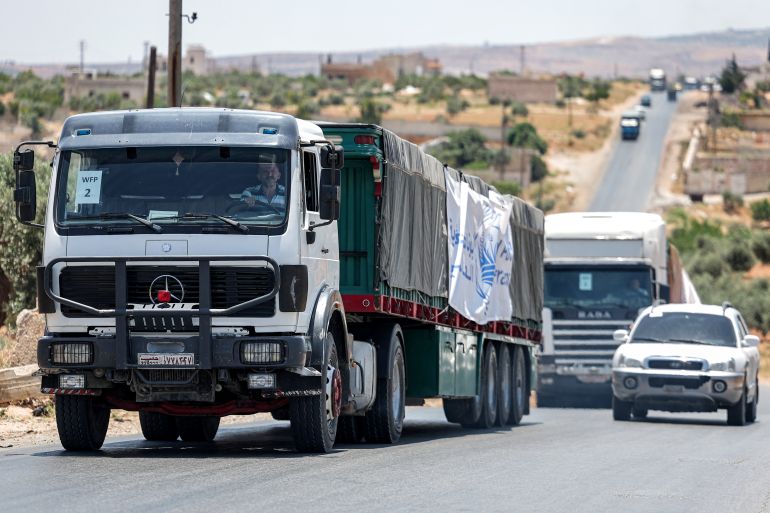Syrian government extends permission for limited UN aid to opposition areas
Syrians in rebel-held northwest fear Assad may choke off badly needed aid as Damascus establishes sway over assistance.

The Syrian government has extended permission for the United Nations to deliver aid to opposition-controlled areas via two Turkish border crossings for a further three months, as it continues to attempt to establish control over badly needed United Nations assistance.
“We greatly welcome the extension of permission by the government of Syria to utilise the Bab al-Salam and Al Ra’ee border crossings until November 13th,” said UN aid spokesperson Eri Kaneko.
Keep reading
list of 3 itemsFour Syrian soldiers killed in Israeli missile attack: Report
Photos: How toys comforted children fleeing Turkey-Syria earthquake
Syria’s mission to the UN in New York confirmed the extension.
Damascus has been allowing the UN to dispatch aid to the opposition-held northwest using the two border crossings from Turkey for three months. In July, the government’s ally, Russia, blocked UN authorisation to extend the use of a separate crossing – a lifeline for those living in the region – for nine months without the permission of the Syrian government.
The move comes as a United States exemption that allowed some transactions linked to humanitarian assistance into the country expired. The exemption was introduced after earthquakes killed more than 50,000 people in Turkey and Syria in February.
Following the earthquakes, the US and the European Union issued sanctions waivers to pave the way for more aid into Syria.
While humanitarian assistance is exempt from sanctions, the waivers aimed to combat the chilling effect of the measures that made some banks and companies wary of dealing with Syria.
The EU has extended its waiver until February 24, but the broad US authorisation – known as a licence – expired on Tuesday.
It “was a time-limited authorisation intended to reinforce existing humanitarian authorisations for disaster relief and ensure that affected Syrians had access to emergency assistance after the earthquake”, said a US Treasury spokesperson.
US authorisations facilitating the work of aid groups and the UN remain in effect, the spokesperson said.
The Norwegian Refugee Council’s Syria advocacy manager, Emma Forster, warned the expiration of the broad US measure “will mean an increase in overcompliance and de-risking that hinders the speed and efficiency of the humanitarian response in Syria”.
‘Ready to resume operations’
The UN had also been using the Bab al-Hawa crossing from Turkey to deliver aid to millions in northwest Syria since 2014 with authorisation from the UN Security Council. But that expired in mid-July after Russia blocked any attempt to increase the length of the authorisation from the previous six-month periods.
Human rights groups and locals living in opposition-controlled areas, which have suffered greatly as a result of the war in Syria and are full of displaced people from other parts of the country, say the short authorisation periods place the area in limbo, with the threat of their removal a tool used by the Syrian government to punish the region.
Just days after the UN Security Council failed to reach an agreement on authorisation, the Syrian government said the UN could continue using the Bab al-Hawa crossing for another six months, but those aid deliveries are yet to resume because the UN has concerns with “two unacceptable conditions”.
“We’re still working to resolve those obstacles. We’re hopeful that we can do so and we do stand ready to resume operations, if those obstacles are overcome,” UN deputy spokesperson Farhan Haq told reporters.
In July, the Syrian government said that the use of Bab al-Hawa for UN aid depended on “full cooperation and coordination with the government”, and the UN not communicating with “terrorist organisations” – a term often used by Damascus to refer to most groups opposed to the rule of President Bashar al-Assad.
The same conditions have not been imposed on the UN use of the Bab al-Salam and Al Ra’ee border crossings.
The International Committee of the Red Cross (ICRC) said the scale of needs in Syria following more than a decade of conflict in addition to the earthquakes “demand swift action and solutions to overcome barriers to humanitarian access”.
“It is essential every possible effort is made to support all avenues of assistance and make possible full, safe, and unhindered humanitarian access to address the needs of people in northwest Syria,” said ICRC Syria spokeswoman Suhair Zakkout.
Syrians who fled al-Assad’s rule fear he may soon be able to choke off badly needed aid as Damascus acts to establish sway over UN assistance into the rebel-held northwest, the last major bastion of the Syrian opposition.
A violent crackdown by al-Assad on peaceful pro-democracy protesters in 2011 led to a civil war, with Moscow backing al-Assad and Washington initially supporting the opposition. Millions of people fled Syria and millions more were internally displaced. Fighting has since abated, with al-Assad back in control of most of the country, after significant military support from Russia.
